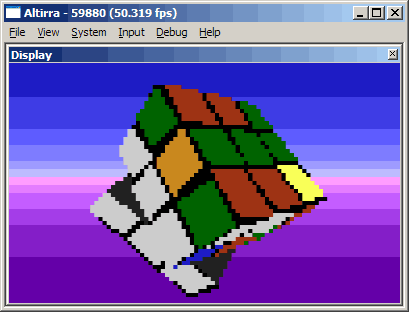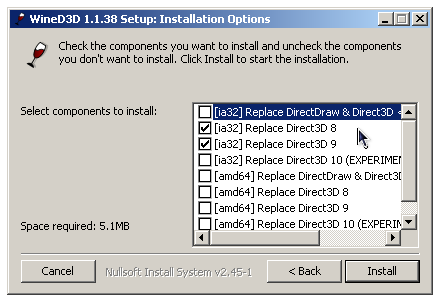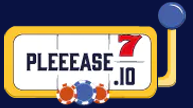Créé par Near (ex byuu) et continué par Luke Usher (PolyBlast / CxBx-Reloaded) et d’autres, Ares est un émulateur multi-systèmes dont le développement a commencé le 14 octobre 2004. C’est un descendant de higan et bsnes. Il se concentre sur la précision et la préservation.

Ares émule les 30 machines suivantes:
– Famicom + Famicom Disk System
– Super Famicom + Super Game Boy
– Nintendo 64
– Game Boy + Game Boy Color
– Game Boy Advance + Game Boy Player
– SG-1000 + SC-3000
– Master System + Game Gear
– Mega Drive + Mega 32X + Mega CD
– Playstation
– PC Engine + PC Engine CD + SuperGrafx
– MSX + MSX2
– ColecoVision
– Neo Geo Pocket + Neo Geo Pocket Color
– Neo Geo AES
– WonderSwan + WonderSwan Color + SwanCrystal + Pocket Challenge V2
A noter qu’un pack de shaders est disponible ici.
Des packs MSU-1 sont disponibles ici.
Voici les informations depuis la dernière version d’ares:
– ares v125 brings significant improvments to Famicom, Mega Drive and Mega CD/32X emulation and minor improvements to Master System and GearGear emulation.
– An issue that caused most recompiler based cores to crash on macOS has been solved.
– The desktop ui also gained support for a ‘screenshot’ hot-key, a crash issue was fixed in the Nintendo 64 emulation core.
– The website has also been updated to house a compatibility list, but a large number of titles have not yet been tested.
– Feel free to submit PRs to add missing entries (edit instructions can be found on the compatibility pages)
Changelog:
– fc: implement GTROM mapper [LukeUsher]
– hiro: track window focus via messages, not polling [invertego]
– mia: prefer known rom extensions in zip archives [invertego]
– ms/sfc: fix some light-gun related crashes [invertego]
– ci: use MSYS2 on Windows, add support for clang.
– Fixes performance issues on Windows [invertego]
– desktop-ui: add screenshot hotkey [kawa-oneechan]
– desktop-ui: fix file/folder browser dialog alignment [invertego]
– desktop-ui: fix linking on older macOS toolchains [rasky]
– fc: add chip type to manifest [encoded-byte]
– fc: always check for ram presence [encoded-byte]
– fc: check for ram and simplify banking [encoded-byte]
– fc: fix jaleco jf14 banking [encoded-byte]
– fc: pinout support for konami vrc7 [encoded-byte]
– fc: support expanded bnrom & uxrom [LukeUsher]
– fc: support for irem g101 mapper [encoded-byte]
– fc: support for irem h3001 mapper [encoded-byte]
– fc: support for item if12 mapper [encoded-byte]
– fc: support for item lrog017 mapper [encoded-byte]
– fc: support for taito x1-005 mapper [encoded-byte]
– fc: support for taito x1-017 mapper [encoded-byte]
– fc: support jaleco fc05 mapper [encoded-byte]
– fc: support jaleco jf13 mapper [encoded-byte]
– fc: support jaleco jf17/19 mappers [encoded-byte]
– fc: support konami vrc2 varient [encoded-byte]
– fc: support taito tc0190 mapper [encoded-byte]
– fc: support taito tc0690 mapper [encoded-byte]
– gg: add ‘Micky Mouse no Castle Illusion (Japan)’ to game database [LukeUsher]
– libco: fix vector register handling on aarch64 [Sintendo]
– libco: optimise co_swap_function on aarch64 [Sintendo]
– m68000: avoid changing interrupt mask on exceptions [TascoDLX]
– m68000: fix disassembly of pc-relative addresses [TascoDLX]
– m68000: restore TAS instruction for cpus other than MD main [TascoDLX]
– mcd: allow continuous CD playbacl [TascoDLX]
– mcd: auto-detect disc region based on boot code, fixes some false detections [TascoDLX]
– mcd: report error on unhandled cdd command [TascoDLX]
– mcd: reset timer on write [TascoDLX]
– mcd: support 3-button pad as default [TascoDLX]
– md: fix interrupt ack special case [TascoDLX]
– md: fix irq issues, timing, delays, ack [TascoDLX]
– md: fix z80 bus access & timing issues [TascoDLX]
– md: improved cpu open bus line accuracy [TascoDLX]
– md: improved timing/signaling for Z80 busreq [TascoDLX]
– md: prevent SRAM from masking out high rom [TascoDLX]
– md: sram support for Super Hydlide (J) [TascoDLX]
– mia: add konami vvrc2/4/6 to database [encoded-byte]
– mia: use database for fc [encoded-byte]
– ms: fix « set VDPBuffer » tests in VDPTEST.sms [LukeUsher]
– n64: increase screen canvas to 576 lines, fixes a crash in certain display modes [invertego]
– nall: Tweak & fix generation of CD subchannel data [TascoDLX]
– nall: Various fixes to CD session handling [TascoDLX]
– nall: improved CD cuesheet loading to handle PREGAP and POSTGAP [TascoDLX]
– recompiler: on macOS allow data segment to be executable [invertego]
– sh2: fix several instructions, default to recompiler [invertego]
– snes: Fix D-Port BOS test in SPC7110 Check Program [jbo-85]
Télécharger Ares (32 bits) v114 (3.3 Mo)
Télécharger Ares (64 bits) v146 (55.9 Mo)
Site Officiel (pour archive)
Site Officiel de substitution
Site de développement
En savoir plus…
































